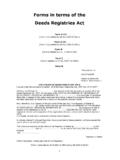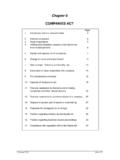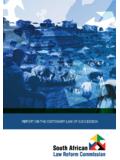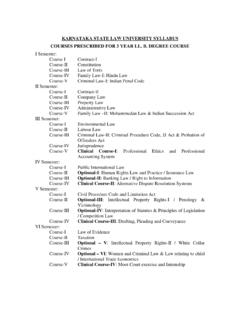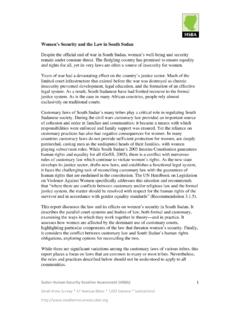Transcription of Chapter 12 INTESTATE SUCCESSION - …
1 Chapter 12. INTESTATE SUCCESSION . INTESTATE SUCCESSION Act 81 of 1987. 1 Aim of the Act 1. 2 Basic Principles 2. The spouse as the sole heir 2. Descendant(s) as sole heir(s) 3. Spouse and descendant(s) as heirs 4. Parents as heirs 6. Parents and descendant(s) of parents as heirs 6. Descendant(s) of deceased's parents as heirs 7. Descendants of only one parent of the deceased 9. Other competent heirs 9. Adopted children 9. Born out of wedlock 9. Child accepted in accordance with customary law as own child 10. Renunciation if surviving spouse is also entitled to inherit 10. Disqualification or renunciation if no surviving spouse 11. 1 AIM OF THE ACT. The INTESTATE SUCCESSION Act, 81 of 1987, came into operation on 18 March 1988. The aim of this act is to regulate anew the law relating to INTESTATE SUCCESSION . _____. [February 2011] [Issue 21]. Chapter 12 - 2 Selfstudy Deeds Course Part 3. Abrie 1 explains the aim of this act as follows: "When a person dies and no valid will can be found, or if his will or a part of it is invalid for one reason or another, his estate or that part of it that cannot be distributed according to the provisions of a will is distributed according to the principles of INTESTATE SUCCESSION .
2 A person's estate or a part of it can therefore devolve by virtue of INTESTATE inheritance. When an estate or a part of an estate has devolved by virtue of INTESTATE inheritance, the provisions of the Act automatically become applicable. The Act regulates the shares in which certain persons will inherit from the INTESTATE testator" (translation). In common law a person's blood relatives are his natural heirs. This act represents a radical departure from common law, however, in that spouses and adopted children are also elevated to the status of INTESTATE heirs. INTESTATE heirs are determined at the date of death of the 2 BASIC PRINCIPLES. "The broad principle followed is: If the testator is survived only by a spouse, the spouse inherits the INTESTATE estate. If the testator is survived only by descendants, they inherit the INTESTATE estate. If there is a combination of a spouse and descendants (children and grandchildren), they inherit the estate jointly in specific shares.
3 If there is no spouse or descendants, the testator's parents and/or their descendants (collateral relatives of the testator) inherit the estate. If there are no parents or descendants of parents, grandparents and other collateral relatives inherit the estate per capita." 3 (translation). The spouse as the sole heir If a deceased person is survived by a spouse, but not by any descendants, the spouse or spouses inherit the entire INTESTATE estate - (section 1(1)(a)). a) If the deceased and his or her life spouse were married in community of property, the spouse receives one half of the estate by virtue of the marriage in community of property and the other half by virtue of section 1(1)(a) of the Act. b) If the deceased and his or her life spouse were married out of community of property, the spouse inherits the entire estate by virtue of section 1(1)(a) of the Act. 1 Op cit., 2 Ibid. _____. [Issue 21] [February 2011].
4 INTESTATE SUCCESSION Chapter 18 - 3. Spouse Deceased 100% person In a polygamous customary union, if the deceased is survived by wives but not survived by any descendant, the estate is divided equally between the wives. 4. Descendant(s) as sole heir(s). If a deceased person leaves descendants, but no spouse, the descendant(s). inherit the entire INTESTATE estate - (section 1(1)(b)). Descendants are therefore the sole heirs. They inherit per stirpes through representation. Division of an INTESTATE estate among descendants takes place per stirpes and representation is permitted - (section 4(a)). A stirpis is a child of the deceased, or a predeceased child who left living descendants. A deceased person therefore has as many stirpes as he left living children or predeceased children with living Deceased person Predeceased Descendant Descendant Descendant Descendant 25% 25% 25% 25%. Descendant of Descendant of predeceased predeceased descendant descendant One half of One half of 25% 25%.
5 3 Abrie, op cit, 4 Deeds Practice Manuals, p. 1-178. 5 Abrie, op cit., _____. [February 2011] [Issue 21]. Chapter 12 - 4 Selfstudy Deeds Course Part 3. Spouse and descendant(s) as heirs 1 If a deceased person is survived by both a spouse and descendants, the spouse inherits the greater of R125, or a child's share of the INTESTATE estate (section 1(1)(c)(i)), and the descendants inherit the residue (if any) of the INTESTATE estate - (section 1(1)(c)(ii)). Balance for distribution: R480 000,00. The greater of R125 000,00 or a child's share =. Spouse Deceased R160 000 person Descendant (adopted Descendant child) (own child). R160 000 R160 000. Section 2(1) of the Reform of customary Law of SUCCESSION and Regulation of Related Matters Act 11 of 2009, provides that the estate or part of the estate of any person who is subject to customary law and who died after 20 September 2010, and who did not leave a will, must devolve in accordance with the INTESTATE SUCCESSION Act, subject to the provisions set out in section 2(2).
6 According to section 2(2) of Act 11 of 2009, where the deceased is survived by a spouse as well as a descendant, such spouse inherits the greater of R125, or a child's share of the INTESTATE estate - (section 2(2)(a) of Act 11 of 2009);. _____. [Issue 21] [February 2011]. INTESTATE SUCCESSION Chapter 18 - 5. In Section 2(2)(b) & (c), reference is made to two types of women , namely - a) a woman, (other than the spouse of the deceased) with whom the deceased entered into a union in accordance with customary law for the purpose of providing children for his spouse's house; and b) a woman who was under customary law married to the deceased (who also was a woman), for the purpose of providing children for the deceased's house. These two types of women, is deemed to be descendants of the deceased person upon the application of the INTESTATE SUCCESSION Act. Although these women are descendants, they are deemed to be spouses in the interpretation of section 1 of the INTESTATE SUCCESSION Act (section 3(1) of Act 11.
7 Of 2009). Where the deceased is survived by spouses (and women) as well as descendants, each surviving spouse (and woman) is entitled to a child's share or R125 000,00, whichever is the greater. Balance for distribution: R480 000,00. The greater of R125 000,00 or a child's share =. Spouse Deceased Spouse R125 000 person R125 000. Descendant Descendant Descendant R57 500 R57 500 Descendant R57 500 R57 500. Where the INTESTATE estate is not sufficient to provide each surviving spouse and woman referred to in section 2(2)(a),(b) and (c) of the Reform of customary Law of SUCCESSION and Regulation of Related Matters Act, 2008, with R125. 000,00, the estate shall be divided equally between such spouses and women - (section 1(1)(c) of the INTESTATE SUCCESSION Act read together with section 3(2) of Act 11 of 2009). _____. [February 2011] [Issue 21]. Chapter 12 - 6 Selfstudy Deeds Course Part 3. 3 A child's share is calculated by dividing the monetary value of the estate by a number equivalent to the number of living children of the deceased or predeceased children who left living descendants, plus - one (the spouse); or the number of spouse(s) and women referred to in section 2(2)(a),(b) and (c) of Act 11 of 2009, whichever is applicable - (section 4(f), read together with section 3(3) of Act 11 of 2009).
8 Parents as heirs If a deceased person is not survived by a spouse or descendants, but is survived by both his parents, his parents inherit the INTESTATE estate in equal shares - (section 1(1)(d)(i)). Father Mother 50% 50%. Deceased person Parents and descendant(s) of parents as heirs If a deceased person is not survived by a spouse or descendants - a) but is survived by one of his parents, the surviving parent inherits half of the INTESTATE estate and the descendants of the deceased parent the other half - (section 1(1)(d)(ii)); or b) if there are no such descendants, the surviving parent inherits the entire INTESTATE estate - (section 1(1)(d)(ii)). _____. [Issue 21] [February 2011]. INTESTATE SUCCESSION Chapter 18 - 7. Father Predeceased 50% Mother 50%. Descendant Descendant Deceased of mother of mother person 25% 25%. Descendant(s) of deceased's parents as heirs 1 If a deceased person is not survived by a spouse or descendant(s) or parents, but is survived by - a) descendants of his deceased mother who are related to the deceased through her only, as well as by descendants of his deceased father who are related to the deceased through him only; or b) descendants of his deceased parents who are related to the deceased through both such parents; or c) any of the descendants mentioned in (a) and (b) above, the INTESTATE estate shall be divided into two equal shares and the descendants related to the deceased through the deceased mother will inherit one half of the estate and the descendants related to the deceased through the deceased father will inherit the other half of the estate - (section 1(1)(e)(i)).
9 In other words: If both the testator's parents are deceased and the testator does not leave a spouse or children, the descendants of the predeceased parents (collateral relatives of the testator, that is his or her brothers and sisters) inherit the INTESTATE estate in a particular 6 Op cit. _____. [February 2011] [Issue 21]. Chapter 12 - 8 Selfstudy Deeds Course Part 3. Predeceased Predeceased father of mother of deceased deceased person person 50% 50%. Descendant of Descendant Descendant father and of father and of only the mother mother father Deceased person One third of 50%. from father's side One third of 50% One third of 50%. from the father's side from the father's side and one half of 50% and one half of 50%. from the mother's from the mother's side side _____. [Issue 21] [February 2011]. INTESTATE SUCCESSION Chapter 18 - 9. Descendants of only one parent of the deceased Where only one of the predeceased parents of the deceased person leaves descendants (collateral relatives of the deceased), those descendants inherit the entire deceased estate - (section 1(1)(e)(ii)).
10 Other competent heirs If a deceased person is not survived by a spouse, descendant(s), parents or descendants of parents, the other blood relatives of the deceased who are related to him nearest in degree inherit the entire INTESTATE estate in equal shares - (section 1(1)(f)). Adopted children An adopted child is deemed to be the legal child of his adoptive parent. An adopted child can inherit from his adoptive parents and their blood relatives - (section 1(4)(e)(i)). Similarly an adoptive parent and his or her blood relatives can inherit from an adopted child - (section 1(5)). An adopted child cannot, however, inherit from his or her natural parents and their blood relatives - (section 1(4)(e)(ii)), and they cannot inherit from him or her - (section 1(5)). An adopted child may however inherit from his natural parent who is also his adoptive parent or who was at the time of the adoption married to the adoptive parent of the child - (section 1(4)(e)(ii)).



